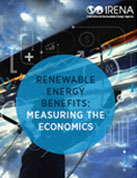Renewable energy benefits: measuring the economics
 This report from the International Renewable Energy Agency (IRENA) provides the first quantification of the macroeconomic impact of doubling the global share of renewables in the energy mix by 2030. The study builds on IRENA’s previous work on the socio-economic benefits of renewable energy, as well as on REmap 2030, IRENA’s roadmap for doubling the global share of renewables. Using a macro-econometric approach, Renewable Energy Benefits: Measuring the Economics takes into account the linkages between the energy system and the world’s economies within a single quantitative framework. The analysis compares a business-as-usual case to two cases of advanced renewable energy deployment. The study shows that the impact of a transition to 36% renewables would benefit economic growth (GDP), welfare and employment in both cases. Doubling the share of renewables in the energy mix by 2030 would increase global GDP by up to 1.1 per cent, improve welfare by up to 3.7 per cent and support over 24 million jobs in the sector.
This report from the International Renewable Energy Agency (IRENA) provides the first quantification of the macroeconomic impact of doubling the global share of renewables in the energy mix by 2030. The study builds on IRENA’s previous work on the socio-economic benefits of renewable energy, as well as on REmap 2030, IRENA’s roadmap for doubling the global share of renewables. Using a macro-econometric approach, Renewable Energy Benefits: Measuring the Economics takes into account the linkages between the energy system and the world’s economies within a single quantitative framework. The analysis compares a business-as-usual case to two cases of advanced renewable energy deployment. The study shows that the impact of a transition to 36% renewables would benefit economic growth (GDP), welfare and employment in both cases. Doubling the share of renewables in the energy mix by 2030 would increase global GDP by up to 1.1 per cent, improve welfare by up to 3.7 per cent and support over 24 million jobs in the sector.
Related Content
- Green hydrogen: enabling measures roadmap for adoption in India
- How can trade policy maximize benefits from clean energy investment?
- Improving the impact of fiscal stimulus in Asia: An analysis of green recovery investments and opportunities
- Climate opportunity report: more jobs, better health, liveable cities
- Renewable energy benefits: leveraging local capacity for offshore wind
- Pursuing the 1.5°C limit: benefits and opportunities- 2016 Low Carbon Monitor
